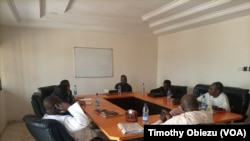“Vision Media Services Limited” reads the inscription on a metal gate leading to a compound on a dusty road in Jabi, a district in Nigeria’s capital, Abuja.
A communication mast tapers into the sky next to a golden-yellow one-story building that houses a media conglomerate comprising seven radio outlets and one television station.
Vision FM is the company's mainstay. Shuaibu Mungadi, its chief operating officer, runs the station with four other senior broadcasters who pride themselves on each having at least 30 years’ experience in journalism.
But the once bustling corridors are quieter than usual. Voices of top company executives who are gathered in a meeting room to discuss the station’s future can be heard from the reception area.
They're reviewing the unexpected sanctions on the station's popular Idon Mikiya or Truth to Power show.
The one-hour current affairs program airs at 5 p.m. Mondays, Wednesdays and Fridays and is the station's most successful. At least 30 million listeners tune in every week from across northern Nigeria, station managers say.
But on Jan. 28, all that changed. Nigerian media regulator, the National Broadcasting Commission, ordered Vision FM to suspend the show for six months and fined the station about $12,500.
At a recent meeting on the suspension, Mungadi sat at a table flipping through documents as management discussed a way forward. Weeks of dialogue have yet to pay off, he told VOA.
"The constitutional role of the media is being trampled by the government, that is the position of things. The government is vehement, the government is indifferent," Mungadi said.
VOA’s requests for a comment from the media regulator were declined.
But in its letter to the broadcaster, the regulator cited a Jan. 5 show that discussed controversies over Rufai Abubakar, head of the National Intelligence Agency (NIA). Nigerian media and critics have questioned Abubakar’s suitability to lead the agency.
The regulator alleged that Vision FM broadcast trade secrets and other issues regarding the national security agency, and that its commentaries lacked fairness and balance.
The content, including information about agency appointments, constituted “a breach of the provision of section 39(3)(b) of the 1999 constitution of the Federal Republic of Nigeria, which imposes restrictions on matters concerning government security services or agencies established by law,” the letter read.
But Mungadi said authorities are twisting the law to stifle views and said the show was just raising important issues.
The Nigeria Union of Journalists, the Socio-Economic Rights and Accountability Project (SERAP) and other rights groups criticized the suspension.
The regulator’s actions come amid an increase in media repression that critics say has worsened under President Muhammadu Buhari.
In January, NIA agents demanded that People’s Gazette reveal the identity of a source use in the newspaper’s reporting about the agency director. In an unrelated incident, unidentified men beat a journalist and damaged equipment at Thunder Blowers, a news website in Zamfara state.
Media rights groups say journalists risk arbitrary detentions or charges under a 2015 cybercrime law. They note that last year, the president suspended Twitter for seven months.
Media watchdog Reporters Without Borders says Nigeria is one of the most difficult places in West Africa to report from, with journalists spied on, arrested, attacked or even killed. The country registered a five-point decline on the World Press Freedom Index last year, ranking 120 out of 180 where 1 is freest.
Authorities deny they are suppressing press freedom. The media regulator has previously said it is not restricting the media but warned news outlets to be conscious of their reporting and said that defaulters will be called to order.
Vision FM feels loss
Back at the radio station, things have not been the same. Every week the station loses about $25,000 usually generated from advertisements and sponsorships, Mungadi said.
The suspension is taking a toll.
"We lost our marketing because there's so much sponsorship on this program, those sponsorships were withdrawn," Mungadi said.
Without that revenue, Mungadi said, he is unsure how long the station can keep up with salaries.
Listeners are also calling to ask why the show is no longer broadcast.
"Once it is five o'clock you'll see a lot of people calling, ‘I am on your station now but I am not hearing Idon Mikiya, what is happening?’ Even if the program comes back we're going to lose a lot of listeners," said station manager Abdul Alugbere.
Supporters in the northern Nigerian states of Kano, Sokoto, and Bauchi attempted to protest the suspension but, Alugbere said, they were stopped by the police.
The suspension shows authorities are not open to criticism, said Kolawole Oluwadare, director of SERAP.
The Nigerian nonprofit focuses on fighting corruption and economic and social rights. When the regulator suspended Vision FM’s show, SERAP issued a statement urging authorities to lift the ban.
"(The suspension) again shows the government's intolerance for whatever is perceived as critical views of government action. We have also approached the station because we're willing to take this up in the public's interest," said Oluwadare.
For now, Mungadi and his team at Vision Media continue to make efforts to reverse the suspension. But he said they'd never renege on journalistic standards, no matter the cost.
"We are journalists, we cannot be intimidated into discarding issues of public interest. We shall rather remain sanctioned than compromised,” said Mungadi.

